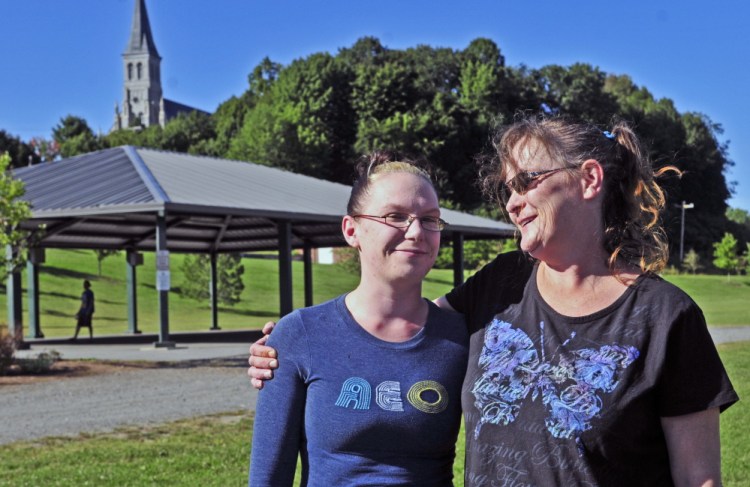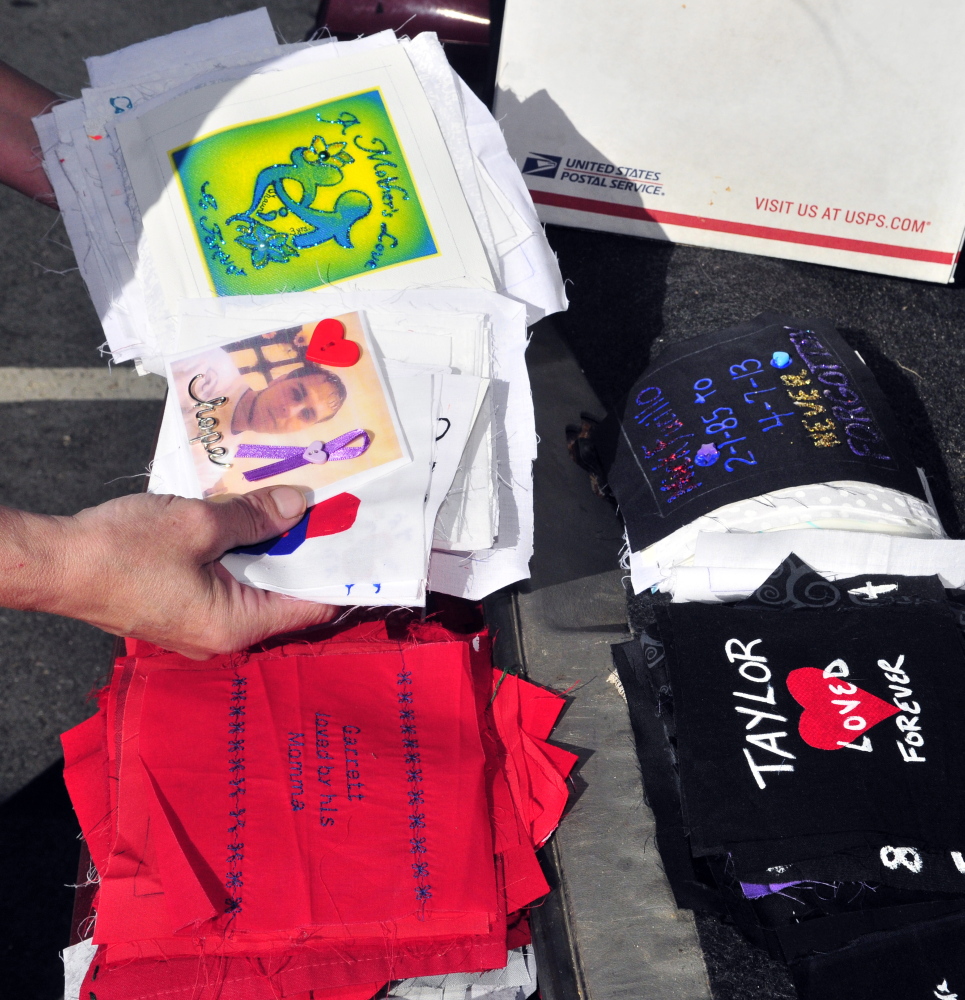Kicking her addiction to prescription drugs took Jessica Ward almost a decade and it nearly cost her her life.
But none of that was as difficult as watching one of her own children go through the same thing.
“Being an addict is so much different than being the mother of one,” Ward said. “I know both sides of the story. I know how they feel and how they feel guilty for the things they are doing, but the drug doesn’t care.”
Ward, of Whitefield, has found comfort in meeting with other mothers like her through the national online support group, The Addict’s Mom. The group has helped lift the loneliness that is so often associated with being the parent of someone who is in the throes of an addiction.
“It’s changed my life,” Ward said. “It’s given me a purpose. What I went through wasn’t for nothing.”
The group on Sunday will host a nationwide campaign, Lights of Hope, to bring mothers together for a vigil being held to offer support and highlight the struggle of addiction. Ward is helping organize the Augusta event, which is scheduled for 5:30 p.m. at Mill Park off Northern Avenue.
In addition to speakers and information on support resources, the vigil will be marked by a candle-lighting ceremony during which family members will burn different colored candles to represent the three stages of addiction: active, recovery and death.
“The event is simple but meaningful,” said New Portland’s Karen Hardy.
Barbara Theodosiou, of Florida, started The Addict’s Mom after learning two of her children were battling drug addictions. What began in 2008 as a small Facebook group has grown to 30,000 members across the country where mothers share their stories, ideas, hopes and suffering.
“There are no breaks, no holidays, there is no solace here,” Theodosiou, who earlier this year lost one of her sons to an overdose, said in a release. “All I can do now is tell his story to the world in the hopes that I am able to make the smallest change in a broken system that houses the mentally ill in violent jails.”
She said The Addict’s Mom works on several fronts, including creating resources to care for addicts and combat addiction, increasing and improving treatment, and providing information to those struggling with addiction.
“Moms come together and share the struggle,” Hardy said. “That’s what The Addict’s Mom is all about: making changes for our family members.”
MAINE BRANCH
There are more than 100 members of The Addict’s Mom in Maine. Ward bemoans the number because she knows it represents just a fraction of the mothers of addicts who would benefit from the group. Still, Ward said, the smaller groups are effective at giving support to those who attend.
“As a mother, you want to fix things,” Ward said. “You want to be able to say whatever it takes to get them help. It’s a struggle not to enable them because you want to fix it. When you enable them, they will continue to use because you’re helping them.”
Ward is one of the few mothers in the group who has waged her own battle against addiction. She first recognized it in the early 1990s when she had surgery to alleviate pain associated with an underlying health problem. The surgery worked. It alleviated Ward’s pain, but it did not do the same for her dependence on the medication she had taken for that pain.
“Three or four days out I realized I was addicted to them because I got really sick,” Ward said.
The addiction would take her to places she never could have imagined going. It cost her family, friends and money and even led to legal trouble.
“You do whatever you have to do so that you’re not sick,” Ward said.
She eventually wound up in a methadone clinic and was prescribed a high dose that was never decreased over nearly 10 years of treatment.
“I was sick of it,” she said. “I had to get up and take this medicine or I couldn’t function.”
She quit taking the methadone and fell violently ill five days later. Her doctor ordered her to the hospital and then back to the methadone clinic. She continued treatment, scaling back the methadone doses and then advancing to other treatment before she was able to end all treatment. She has been drug free for 13 years.
“If I had known then what I know now, I would never have taken that first pill ever,” Ward said. “I did a lot of stupid stuff during active addiction.”
Ward said she was able to shed the chains of addiction, and keep them off, due in large part to the support she received at home.
“My husband has stuck with me,” Ward said. “He’s been my rock through everything. Not all addicts are that lucky.”
DAILY STRUGGLE
Watching Ward’s life devolve into addiction was not enough to keep her daughter from following in her shoes. Ward’s daughter, 23-year-old Shauna Wade, has been drug-free for about two years after becoming addicted to prescription narcotics at 19. Staying sober is a daily struggle.
“My kids saw the heck I went through to get off pain pills,” Ward said. “They weren’t blind to what I went through.”
Ward’s instinct, like most mothers, is to protect their children. Everything within her tells her to give them food when they are hungry or a place to sleep when they are homeless, but she knows the hunger and homelessness are the cost of an active addiction. Any form of help, even just giving them food, only allows them to feed that addiction.
“If we bring them home, they’re spending their money on other things,” Ward said. “If you leave them out on the street, they could die alone. The guilt from that, either way, I can’t even explain it.”
Wade said her addiction started when her partner gave her a pill for a migraine.
“He gave me a pill and it made it go away,” Wade said. “I was pretty much hooked.”
Wade liked how she felt so she tried another pill a week later. She needed a third in just a few days.
“It was every single day after that,” she said. “It’s a slippery slope. You go down fast.”
The active addiction lasted about two years. She could see, even in the midst of it, the heavy tax she was paying to feed her habit, but desire for pills was always stronger than her fear and loss.
“I lost almost everything,” Wade said. “I managed to keep my daughter. I don’t know how.”
Wade acted as though nothing was wrong when she was around Ward, hoping her addiction would slip by unnoticed. Wade knew it didn’t.
“I didn’t want to tell her,” Wade said. “I didn’t want her to be disappointed in me, but she knew. So did everyone else.”
Wade, in sobriety, is slowly earning back what addiction took from her. She’s a manager at an area restaurant, taking care of her daughter and hoping to go back to school. That’s a challenge because Wade has to work full time to support her daughter.
“She’s been doing great,” Ward said. “She makes me proud because she’s so strong.”
Wade has been suffering from back pain and recently asked Ward to go with her to the hospital to try and get some relief. Ward told the doctor that over-the-counter medications have not worked. Ward said it was an opening her daughter could have easily, even understandably, used to seek a prescription for narcotics, but Wade quickly told the doctor of her addiction. She is continuing to seek other avenues for pain relief.
“It was a proud momma moment,” Ward said. “Most addicts will not say that.”
GROWING PROBLEM
The family’s story is one retold day after day in Maine, and the problem is growing. A recent report released by the office of Attorney General Janet Mills shows that deaths related to heroin and fentanyl, a narcotic pain reliever, continue to climb, while the overall number of drug overdose deaths will likely mirror 2014, the worst year on record.
There were 105 people who died from drug overdose deaths in the first half of 2015. Heroin accounted for 37 of those and 26 were primarily attributable to fentanyl. There were a total of 208 overdose deaths in 2014, including 57 primarily attributable to heroin and 43 to fentanyl.
“These numbers are terribly distressing,” Mills said in a recent press release. “The first six months of 2015 show that this crisis is unabated and we … still have a great deal of work to do.”
Hardy, the New Portland woman helping to organize Sunday’s Lights of Hope, would like to see people come whether they’ve been personally impacted by addiction or not. The impact of addiction is felt across the community, she said, and it takes a community response to help those in the middle of the battle. Hardy said she has found that community in The Addict’s Mom. The group members, Hardy said, offer support and compassion without the judgment mothers of addicts so often feel from the community and are so prone to heaping upon themselves.
“I know things are gearing up for this issue in Maine,” Hardy said. “That’s the goal, to raise awareness and reduce the stigma and make some change so people don’t have to die and families don’t have to suffer.”
Craig Crosby — 621-5642
Twitter: @CraigCrosby4
Copy the Story LinkSend questions/comments to the editors.




Success. Please wait for the page to reload. If the page does not reload within 5 seconds, please refresh the page.
Enter your email and password to access comments.
Hi, to comment on stories you must . This profile is in addition to your subscription and website login.
Already have a commenting profile? .
Invalid username/password.
Please check your email to confirm and complete your registration.
Only subscribers are eligible to post comments. Please subscribe or login first for digital access. Here’s why.
Use the form below to reset your password. When you've submitted your account email, we will send an email with a reset code.